|
A landmark constitutional climate lawsuit brought by 15 young Canadians against Canada’s federal government will come before a court this week for two days of hearings to determine if the case will advance to trial. Should the case go to trial, it would be one of the first courtroom trials anywhere in the world in litigation brought by youth against their national government over the climate crisis.
The Canadian lawsuit La Rose et al. v. Her Majesty the Queen, filed almost exactly a year ago in October 2019, argues that Canada is contributing to dangerous climate change – such as by permitting fossil fuel projects – despite knowing the risks and that this amounts to violations of young people’s rights under a part of Canada’s constitution called the Canadian Charter of Rights and Freedoms. The youth also say the Canadian government is violating its legal obligations to protect life-sustaining natural resources under a legal doctrine known as the public trust doctrine. The claims are essentially the same as ones brought by 21 American youth against the U.S. federal government in the groundbreaking case Juliana v. United States. The La Rose lawsuit is the Canadian equivalent of the Juliana climate case. Canada has responded by trying to have the court strike (dismiss) the case. This week’s hearings, on Sept. 30 and Oct. 1 at the federal court in Vancouver, are on the motion to strike. Canada is expected to argue that addressing climate change is a political matter that cannot be resolved by courts. The government also says that the public trust doctrine does not exist in Canadian law. But for the young people suing their government over the unfolding climate crisis that they say disproportionately harms them, governments have so far failed to fix the problem and court intervention is therefore necessary to prevent further harm. “We can’t leave this to politics. We’ve tried that for 30 years or more,” youth plaintiff Ira from Caledonia, Nova Scotia said during an online press briefing last week. “We’ve been forced to turn to the courts,” he added. “The courts are our only viable option right now.” Fellow youth plaintiff Albert Lalonde from Montreal, Quebec explained that youth climate activists have tried other means like engaging with politicians and protesting to demand climate action. “We are being deliberately ignored,” Lalonde said. “The bottom line is we have rights and they are being violated.”
0 Comments
A federal district judge in Rhode Island has ruled to allow a climate adaptation lawsuit brought by a New England environmental law organization against oil major Shell to advance towards discovery and trial. According to Conservation Law Foundation (CLF), the organization suing Shell over climate risks to its oil storage facility located in Providence, R.I., the case proceeding to discovery marks the first time a private fossil fuel entity will need to fully answer for its knowledge of climate change and the risks it presents. In the ruling issued on Monday, September 28, 2020, Judge William Smith of the U.S. District Court for the District of Rhode Island mostly denied Shell’s motion to dismiss the case. He did find that CLF could not sue over potential long-term or distant future risks (such as from flooding and seal level rise) to Shell’s oil terminal. But the imminent danger of near-term climate risks was clear enough, Judge Smith determined, to warrant rejecting Shell’s attempts to toss the case.
“The Complaint makes clear that a major weather event, magnified by the effects of climate change, could happen at virtually any time, resulting in the catastrophic release of pollutants due to Defendants’ alleged failure to adapt the Terminal to address those impending effects,” Smith wrote in his order. Conservation Law Foundation sued Shell in 2017 over the company’s fuel terminal that sits along the shore of the Providence River, claiming the facility is not designed to withstand extreme storm events or coastal flooding caused by sea level rise and is therefore putting the surrounding environment and community at risk. The suit alleges Shell is violating the Clean Water Act by failing to report pollution discharges from the facility and by failing to fortify the facility in the face of climate change, which is causing sea levels to rise and leading to more intense storms and flooding. CLF is seeking civil penalties and an order requiring environmental restoration and action to prevent future harm such as an oil spill. The lawsuit is one of several legal actions CLF is taking against major oil companies over their New England oil terminals that the environmental group says are not designed to withstand increasingly extreme weather events. The companies’ failure to adapt their terminals, CLF contends, puts the surrounding environment and communities at risk. Judge Smith referenced this concern during a (virtual) hearing held August 13 in the Rhode Island case on Shell’s motion to dismiss. He said the situation seems to be one where “a bomb is going to go off, just don’t know when.” Shell had argued that climate risks are “speculative” and not substantial in the near-term, and therefore it is not required to take action to fortify its Providence oil terminal. CLF additionally brought claims under a statute governing discharge of hazardous waste called the Resource Conservation and Recovery Act. Judge Smith declined to dismiss those claims. “Today’s decision means we will have our day in court on unlawful Shell decisions that left Providence families and all of Narragansett Bay at imminent risk of catastrophic oil and toxic chemical spills,” CLF President Bradley Campbell said in a press release responding to the judge’s ruling. “The company has for years deceived regulators and the public about the global and local risks of the climate crisis. CLF will now have the opportunity to hold Shell accountable for years of neglect and outright deceit at the expense of public safety.” Story originally published by DeSmog On Wednesday, September 23, several members of Congress introduced a resolution in both houses that supports the principles and demands of the 21 youth suing the U.S. government in the landmark constitutional climate case Juliana v. United States. Titled the “Children’s Fundamental Rights and Climate Recovery Resolution,” this Congressional resolution, though nonbinding, demonstrates one way that Congress can play a key role in supporting the growing calls to hold the federal government and fossil fuel companies accountable for the devastating damages of the climate crisis. In January, a divided federal appeals court dismissed the Juliana youth lawsuit, but the youths have asked the full court to review that dismissal and a decision is still pending. Young people like the Juliana plaintiffs and communities across the country have turned to the courts in filing lawsuits demanding climate accountability. More than 20 municipalities and states are suing major oil and gas companies like ExxonMobil over the fossil fuel industry’s campaigns to discredit climate science, deceive the public on climate risks, and delay policy action to reduce greenhouse gas emissions. The young people suing the U.S. government in Juliana argued that the executive branch has promoted a fossil fuel energy system that contributes to dangerous climate change, putting their constitutional rights like rights to life and liberty at risk. In both types of cases, Congress could signal its support for the youth and communities going to court over the climate crisis. That idea is essentially what the new concurrent resolution on children’s fundamental rights is about, a symbolic gesture backing the demands of the Juliana youth plaintiffs. “The youth seek protection of their constitutional rights to life, liberty, property, and equal protection under the laws, which includes a climate system capable of sustaining human life,” Congresswoman Pramila Jayapal (WA-07), one of the original House sponsors of the concurrent resolution, said in a press release. “Everyday I see catastrophic climate-related events escalating. This resolution is more important than ever because children’s rights are at stake.” The resolution recognizes that the climate crisis disproportionately affects the health, economic opportunity, and fundamental rights of children and calls on government agencies tasked with implementing climate and energy policy to develop a science-based climate recovery plan, which involves rapidly slashing emissions and working to draw down atmospheric carbon dioxide concentrations to under 350 parts per million by 2100. The resolution is sponsored by Rep. Jayapal along with Reps. Jan Schakowsky and Bobby Rush of Illinois and by Senator Jeff Merkley (D-OR). Additionally, 57 members of Congress including seven Senators and 50 House members have already signed on as co-sponsors. The resolution has also been endorsed by 50 organizations working in areas of climate, human rights, public health, law, labor, minority rights, business, and faith. During a virtual press conference on Wednesday, several of the Juliana plaintiffs spoke to how the climate crisis is already impacting them, such as with the recent unprecedented wildfires ravaging the western U.S. that left Oregon teens Avery McRae and Isaac Vergun unable to go outside and freely breathe fresh air. “Our lives are at stake, my ability to breathe clean air is stake,” Avery explained. “My future and the future of humanity is at stake.” All Three Branches of Government Needed in Climate Fight While a congressional resolution doesn’t have the force of law behind it, the statement sends a message that at least some members of Congress recognize the intergenerational injustice inherent in the climate crisis and the comprehensive action required to address it. As one of the youth plaintiffs and one of the Congressional sponsors said, all branches of government must be involved in addressing the crisis. “It’s going to require systemic change and all three branches of government,” Vic Barrett, a 21-year-old plaintiff originally from New York, said during the press conference. “To attack the climate crisis head-on, all three branches of the federal government have to comply with the unique and vital roles each plays in upholding our constitution,” added Rep. Jayapal. The U.S. Department of Justice and fossil fuel industry have defended against climate lawsuits by arguing that courts cannot solve the problem, placing sole responsibility on authorities like Congress and international negotiations, even though these forums have been heavily swayed by industry money and lobbying. When a panel of judges dismissed the Juliana case earlier this year, they said the youth must make their case to the political branches of government, despite the reality that polluting interests have made bold federal climate action nearly impossible.
Lawyers supporting climate lawsuits against the federal government and against fossil fuel companies say that courts do have a key role to play in the context of climate change, separate but complementary to that of Congress. “It is now incumbent on the judicial branch to ensure that the fundamental rights of children are protected,” Julia Olson, lead lawyer for the Juliana youth plaintiffs, said in the press release on the Congressional resolution. Opposing Liability Waivers and Investigating Fossil Fuel Industry Deception “Accountability lawsuits are a critical part of what we need going forward along with climate legislation,” attorney Pam Gilbert of the Washington, D.C.-based law firm Cuneo Gilbert & LaDuca, LLP, said during an online briefing Tuesday on the topic of Congress and climate litigation. That briefing, hosted by the Center for Climate Integrity and Chesapeake Climate Action Network, focused on the role of Congress in efforts to hold major fossil fuel companies accountable for climate deception and climate damages. There are currently more than a dozen lawsuits pending that seek to make these companies pay for some of the enormous costs associated with climate change, like building sea walls to guard against rising seas and flooding. As Rep. Jamie Raskin (MD-08) noted during the briefing, protecting access to the courts by refusing to include legal immunity for the fossil fuel industry through legislation is something Congress can do to support these lawsuits, which are grounded in the “polluter pays principle.” “If [polluters] inflict damages, they have to pay for it,” Raskin said. In May the Maryland Congressman authored a letter signed by 60 House members opposing liability waivers sought by the fossil fuel industry during negotiations over coronavirus economic relief measures. This opposition to liability waivers (basically a get-out-of-jail-free card) for polluters also made it into a statement in the House Democrats’ climate action plan released in late June. “I want to make sure Congress is doing everything we can to stop efforts to interfere with [these climate] lawsuits proceeding,” Raskin said during the Tuesday briefing, titled “The Fight for Polluter Accountability: Congress and Climate Litigation.” Additionally, Raskin (who is also one of the 50 House co-sponsors on the resolution supporting the Juliana plaintiffs) led a hearing last October in the House Oversight Committee, the first House hearing probing the oil industry’s campaign of deception around climate science. Holding more of these kinds of investigative hearings is another way Congress can support demands for climate accountability. “Much more can and should be done by Congress to investigate what this [fossil fuel] industry did to manipulate climate science in order to protect their profits,” said Gilbert, the attorney who supports the Center for Climate Integrity, an initiative advocating for climate liability lawsuits against the fossil fuel industry. “Allowing fossil fuel companies to escape accountability for decades of deception will set a terrible precedent,” she said. “Congress has an important role to play here both in [leading] investigations and protecting access to the courts.” A judge in Poland has ruled that operators of the Bełchatów coal plant – Europe’s single biggest emitter of carbon pollution – must negotiate a settlement with environmental lawyers that brought a lawsuit last year over the coal plant’s destructive environmental and climate impacts.
The ruling, which followed a hearing on Tuesday, Sept. 22 in the District Court of ŁódĽ, could put the Polish coal facility on a path towards closure. Lawyers for the environmental law charity ClientEarth argued that closing the Bełchatów plant’s coal operations is necessary in the face of the climate crisis. The power plant burns 45 million tons of coal every year, equivalent to a ton every second, and has emitted over a billion tons of CO2 over its lifetime. The plant’s annual emissions are roughly equal to the total annual emissions of New Zealand. According to a ClientEarth media release, the judge confirmed that the climate crisis and real and must be acted upon, a first of its kind determination for courts in Poland. “We all see the damage climate change is doing. We all breathe the same air,” the judge said during the hearing. Per the court ruling, ClientEarth and the Bełchatów plant operators must reach a settlement in the next three months. ClientEarth lawyers have demanded that Bełchatów close 11 of its 12 coal units by 2030 and the last by 2035, according to the media release. “This ruling is a major breakthrough for the environmental movement. It puts environmental experts at the table with coal companies, to find a solution that genuinely works for the climate,” said Marcin Stoczkiewicz, head of ClientEarth’s Central and Eastern Europe operation. ClientEarth filed the lawsuit almost exactly a year ago, on September 26, 2019. The environmental law NGO described it as a “first-of-its-kind lawsuit, seeking to hold coal plant operators to account for the direct impact their operations have on the planet and the surrounding environment.” The case included claims under Polish civil law that recognizes the environment as a common good and allows organizations to challenge environmentally destructive activities. “Belchatow Power Plant has provided Poland with vital power for decades but times have changed,” Stoczkiewicz said. “The largest emitters, like Belchatow, must shoulder their share of responsibility for the climate crisis. Without a rapid coal phase-out, the climate fight will be futile.” Climate Lawsuit Filed in Spain Demanding Government Increase Ambition in Confronting Climate Crisis9/22/2020 Environmental organizations have brought a climate change lawsuit against the government of Spain in an effort to compel more ambitious action in addressing the climate emergency.
Greenpeace Spain, Ecologistas en Acción and Oxfam Intermón filed their case before Spain’s Supreme Court on September 15 contending that Spain has failed to take adequate action on climate in violation of the nation’s international obligations and legal duties. It is the first domestic climate lawsuit initiated against the Spanish government. “To avoid devastating climate change there is only one way: to drastically and rapidly reduce CO2 emissions and accelerate the ecological transition, which requires courageous political and judicial decisions,” Mario Rodríguez, director of Greenpeace Spain, said in a press release. The lawsuit claims that Spain has breached its obligations under a European Union law - Regulation (EU) 2018/1999 – regarding governance of the Energy Union and Climate Action, a framework for establishing national climate policies. According to the environmental organizations, that regulatory framework required Spain to approve a National Energy and Climate Plan and a Long Term Strategy by December 2019, which the government has not done. The government’s draft plan, the environmental plaintiffs argue, is incompatible with the goals of the Paris Climate Agreement and particularly the more ambitious goal of limiting global temperature rise to 1.5 degrees C. Spain’s draft climate plan currently calls for a 23 percent reduction in greenhouse gas emissions (below 1990 levels) by 2030. Plaintiffs say this is insufficient based on scientific recommendations from the Intergovernmental Panel on Climate Change (IPCC). Those IPCC guidelines for limiting warming to 1.5 degrees C would necessitate that Spain pursue emissions cuts of at least 55 percent by 2030 and net zero emissions by 2040, according to the environmental plaintiffs. The nongovernmental organizations (NGOs) are seeking a court order requiring Spain to take more aggressive climate action, specifically to reduce emissions by 55 percent (below 1990 levels) by 2030 and achieve net zero emissions by 2040. According to Oxfam, this greater ambition to address climate change is necessary for the Spanish government to ensure protection of the fundamental human rights of its citizens. “As in the rest of the planet, [and] in Spain, the most vulnerable people are both those who pollute the least and those who have the least resources to adapt and mitigate the consequences of climate change,” said Franc Cortada, director of Oxfam Intermón. “It is important that any process of ecological transformation in our country have mechanisms to defend these people.” “With current commitments to reduce emissions, Spain will not be able to avoid the impact of serious drought episodes, the increase in the number and intensity of fires and a higher rise in sea level with its consequent coastal floods that are yet to come,” Greenpeace lawyer Lorena Ruiz-Huerta wrote in a blog post. “For this reason, the three organizations consider it unavoidable to initiate this lawsuit against the Government, the only instance to which to turn, due to its totally insufficient activity in recent decades to mitigate climate change that puts the most essential rights of present [and future] generations at serious risk,” she added. This lawsuit is part of a rising tide of global climate litigation demanding governments take more urgent climate action. Similar cases seeking stronger climate policies have been filed in countries like Germany, France, Belgium, the Netherlands and Ireland. Cases in the latter two countries have been successful in challenging inadequate government climate policies. Earlier this month a group of six young people from Portugal filed an unprecedented climate lawsuit against 33 European countries, including Spain, on human rights grounds. Story originally published by DeSmog As rampant wildfires worsened by climate change continued to batter the western U.S. this week, a Washington state appeals court examined the question of whether young people should be allowed to sue their state government over the climate crisis. The hearing, held Thursday, September 17, is part of a case brought by 13 Washington youth against the Evergreen State. That case, Aji P. et al. v. State of Washington, argues that the government is violating the youths’ fundamental rights under the state constitution through policies that perpetuate fossil fuels and fail to reduce carbon emissions rapidly enough to avoid catastrophic climate consequences. At a time when the state is literally on fire and climate calamity impossible to ignore, the court appeared skeptical of the state’s argument that the political branches of government are doing enough to address the crisis and that climate change doesn’t undermine fundamental rights protected by the constitution. “For the last 10 days, I can’t go outside. If I go outside, I’m threatening my life. I have asthma. So I have to stay inside with the windows shut. Why isn’t that affecting my life?” Judge David S. Mann asked Assistant Attorney General Chris Reitz, the lawyer representing the state in this case. Reitz argued that climate change affects all of society and is a matter for the political branches of government to sort out, not the courts. This argument that the climate crisis issue is a “political question” that courts cannot resolve is ultimately what led King County Superior Court Judge Michael Scott to dismiss the case in August 2018. The youths are appealing, and in Thursday’s 20-minute hearing before the Washington State Court of Appeals, the judges repeatedly questioned Reitz during his argument while allowing the youths’ attorney Andrea Rodgers to present her arguments uninterrupted. Judge Lori K. Smith, for example, questioned Reitz why the court could not simply determine that the state, by not reducing emissions quickly enough, is endangering the youth plaintiffs.
“Can’t we just say the pace [of emissions reductions] you set is inappropriate, set a faster pace?” she asked. Reitz argued that such a determination would require the court to find that there is a constitutional duty to ensure a stable climate system, and that no such constitutional right exists. But as the youths' attorney Andrea Rodgers told the court, young people’s basic rights like the right to life and liberty, which are clearly protected under the constitution, are at risk from the climate crisis and the inadequate responses from government to address it. The Washington Supreme Court has previously ruled that the state violated children's constitutional right to education through the government's underfunding of public schools. The youth in this climate lawsuit are similarly arguing that the government, though policies that support fossil fuels and fail to drastically rein in greenhouse gas emissions, is infringing on young people's fundamental rights. The youths’ “very lives and liberties are at stake,” Rodgers said. She opened her argument describing how climate change right now is personally impacting one of the case's youths through the state's devastating wildfires, which have burned more than 800,000 acres and destroyed over 400 homes and other structures this year. Rodgers described the experience of 15-year-old plaintiff Kailani S., a member of the Colville Indian Nation who currently lives in the north-central Washington town of Omak, just a few miles from a major fire. “These are fires Gov. Inslee just last week called the climate fires … fires from which Kailani cannot escape, putting her personal security and safety at risk,” Rodgers said. “This case challenges the actions the state has taken to exacerbate these very climate change conditions that in real time are infringing upon Kailani’s and the other plaintiffs’ constitutional rights to life and liberty.” The youths are seeking a court order that declares the state is endangering its youth and requires the state to develop an enforceable climate recovery plan guided by the best available climate science. The youth lawsuit targets various state agencies that implement climate and energy policies as well as Washington Governor Jay Inslee, who is widely regarded as a strong supporter of climate action and campaigned in the Democratic presidential primary on the singular issue of climate change. But while Gov. Inslee and the Washington state government are taking some actions to address climate change, the youth plaintiffs and their lawyer say these actions don’t go far enough to protect the youths from climate harms that are already unfolding and are projected to worsen. “My young clients are experiencing devastating climate change impacts today. Many are unable to safely leave their homes because of the deadly air quality,” Rodgers said in a press release. “We are hopeful that the judges recognize how climate change affects individual rights to life and liberty and allow these children to present evidence at trial to prove that their government is making these climate harms worse.” Story originally published by Drilled News
On Monday, September 14, Connecticut announced it had filed a lawsuit in state court against oil major ExxonMobil for alleged “decades of deceit” on the risks of climate change that stem from burning fossil fuels. “ExxonMobil sold oil and gas, but it also sold lies about climate science,” Connecticut Attorney General William Tong said in a press release. “ExxonMobil knew that continuing to burn fossil fuels would have a significant impact on the environment, public health and our economy. Yet it chose to deceive the public. No more.” At a time when much of the West Coast is engulfed in flames, fossil fuel companies are facing a torrent of climate accountability lawsuits from cities and states with four new cases filed this month alone. Connecticut’s lawsuit comes on the heels of back-to-back lawsuits filed against Exxon and other oil and gas companies by the city of Charleston, South Carolina and by the state of Delaware on September 9 and 10, respectively. Hoboken, New Jersey sued some of these same fossil fuel firms on September 2. All of these cases are centered on allegations that the industry deliberately deceived the public on the climate risks of its fossil fuel products in order to stave off climate policies and protect profits. “ExxonMobil’s strategy to create uncertainty about climate science successfully kept consumers purchasing ExxonMobil products by deceiving consumers about the serious harm caused by ExxonMobil’s industry and business practices,” Connecticut argues in its complaint. The state says this deception is ongoing through “greenwashed advertising” that downplays Exxon’s significant role in causing climate change while misleadingly portraying the company as seriously committed to solving the problem. This deception, Connecticut argues, constitutes violations of the state’s anti-fraud statute, called the Connecticut Unfair Trade Practices Act. The lawsuit brings eight counts of violations under this Act against Exxon. Connecticut is seeking to compel Exxon to stop its deceptive acts, disgorge profits gained through its decades of deception and pay civil penalties, disclose all research the company or its affiliates have conducted on climate, and fund a “corrective education campaign to remedy the harm inflicted by decades of disinformation.” The state of Minnesota, which sued Exxon and several other major oil entities in June, is also seeking this kind of corrective educational campaign funded by the industry . “ExxonMobil’s campaign of deception has contributed to myriad negative consequences in Connecticut, including but not limited to sea level rise, flooding, drought, increases in extreme temperatures and severe storms, decrease in air quality, contamination of drinking water, increases in the spread of diseases, and severe economic consequences,” the complaint states. “The success of ExxonMobil’s campaign of deception has helped to ensure that people of the State of Connecticut will continue to experience the catastrophic consequences of climate change for the foreseeable future,” the complaint further argues. Responding to a request for comment, Exxon spokesperson Casey Norton sharply criticized the lawsuit. “Legal proceedings like this waste millions of dollars of taxpayer money and do nothing to advance meaningful actions that reduce the risks of climate change,” Norton said in an emailed statement. “ExxonMobil will continue to invest in efforts to reduce greenhouse gas emissions while meeting society’s growing demand for energy,” Norton added. “The claims are baseless and without merit. We look forward to defending the company in court.” Connecticut is now the fifth state currently suing Exxon over alleged climate deception. Massachusetts filed a case on October 24, 2019 accusing the company of misleading investors and consumers in violation of the state’s consumer protection law. That lawsuit was filed while Exxon was on trial in New York in a high-profile securities fraud case brought by the New York attorney general accusing the company of misleading investors. Exxon ultimately prevailed in that case, but the judge noted in his ruling last December, “Nothing in this opinion is intended to absolve Exxon Mobil from responsibility for contributing to climate change in the production of its fossil fuel products.” The Massachusetts case against Exxon is advancing in Massachusetts state court. Other states that have filed climate accountability lawsuits include Rhode Island, which sued 21 fossil fuel companies in July 2018; Minnesota, which sued Exxon, Koch Industries and the American Petroleum Institute on June 24 this year; and Delaware, which sued 30 fossil fuel companies plus API last week. District of Columbia Attorney General Karl Racine also filed a consumer fraud lawsuit against the four largest investor-owned oil and gas companies on June 25, just one day after Minnesota AG Keith Ellison announced his state’s suit. Overall, 23 communities across the U.S. have filed climate accountability lawsuits against the fossil fuel industry over the last three years. Story originally published by DeSmog
This week, a group of eight Australian teens has brought a groundbreaking new climate change lawsuit against Australia’s Federal Minister for the Environment in an effort to stop a proposed coal mine expansion in the state of New South Wales, roughly 267 miles north of Sydney. Filing a class action lawsuit in federal court, these students are representing not just themselves but young people under age 18 across Australia and around the world, as the generation that is particularly imperiled from the climate crisis and the continued fossil fuel expansion driving climate breakdown. “The climate crisis will disproportionately impact young people as many of us will live into the second half of this century, far beyond many projections of climate catastrophe,” said Laura Kirwan, a 16-year-old plaintiff from Sydney who is active in Australia’s School Strike 4 Climate. The lawsuit is the latest in several climate cases brought by young Australians in recent months. In July a 23-year-old Melbourne law student named Katta O’Donnell filed a class action lawsuit against the Australian government for allegedly failing to disclose to government bondholders the climate-related risks of their investments. In May, a group of young Queenslanders under the name Youth Verdict filed a lawsuit against the developer Waratah Coal, challenging the Galilee Coal Project. That project in central Queensland, with its multiple underground and open-pit mines, is expected to produce 40 million tons of coal per year and would generate nearly 3 billion tons of greenhouse gas emissions over three decades. Youth Verdict is suing on the grounds that the Galilee Coal Project will exacerbate climate change and violate these young people’s human rights under the Queensland Human Rights Act. Passed in 2019, this new law recognizes fundamental rights such as rights to life, security of the person, equality before the law, and the protection of families and children. This latest youth-led lawsuit, Sharma et al. v. Minister for the Environment, is challenging a coal mine expansion in New South Wales known as the Vickery Extension. Last month, state authorities approved the project, which was proposed by Whitehaven Coal. The mine expansion would allow Whitehaven to extract another 10 million tons of coal annually, an increase of 250 percent over its original mine. Furthermore, the expansion is expected to release an extra 100 million tons of climate pollution, bringing the mine’s total to roughly 370 million tons or the equivalent of about 70 percent of Australia’s total carbon emissions from 2019. Australia’s Environment Minister Sussan Ley is the federal official currently weighing whether to approve the Vickery Extension project, which is broadly opposed by local communities. The youth lawsuit, brought by students between age 13 and 17, seeks a court order directing Ley to squash the project. The lawsuit argues that climate change is causing grave harm and that new coal projects exacerbate that harm, particularly for young people as climate impacts worsen over time. “Burning coal is the single largest contributor to this crisis and Australia is the world’s largest coal exporter,” Equity Generation Lawyers explains on the case’s website. “To make it worse, we know that young people and children are particularly vulnerable to the impacts of climate change.” Equity Generation Lawyers is an Australian law firm specializing in climate change law and is representing the youth in this class action suit. It is the same firm representing Katta O’Donnell in her case against the federal government. Equity Generation Lawyers argues in the Sharma case that the environment minister has an obligation, or “duty of care” under Australian common law, to prevent foreseeable harm to vulnerable people. If successful, the case could have a real impact in terms of “preventing all new coal mines from being approved in this country,” according to the law firm. “Such an approach to a climate change case has not been tested before in Australia, and would chart new territory if successful,” Laura Schuijers, a research fellow in environmental law at the University of Melbourne, wrote in The Conversation. “Although a legal victory would appear difficult on these grounds, the implications of this case are already significant. They show young people, determined to fight for action on climate, will continue to find new ways to hold powerful people to account.” Australia has already seen a court decision striking down a coal project largely due to environmental and climate concerns. In February 2019 the Land and Environment Court in New South Wales rejected a mining company’s appeal of a government decision not to permit a new open-pit coal mine. Chief Judge Brian Preston wrote that the coal project “would be in the wrong place at the wrong time.” He explained that this is not the time to be building new coal mines because coal “will increase global total concentrations of [greenhouse gases] at a time when what is now urgently needed, in order to meet generally agreed climate targets, is a rapid and deep decrease in [greenhouse gas] emissions.” On September 9, just one day after the Australian teens filed their class action against the Vickery coal project, United Nations Secretary General António Guterres said in a press conference on the release of a new international climate science report: “The coal business is going up in smoke.” “Climate action is the only way to ensure a livable planet for this and future generations,” he added. But according to young climate activists like the Australian teens suing the federal environment minister, governments are not taking climate action seriously, which they say forces them to turn to the courts. “I have grown up listening to conversations about the climate crisis but I’ve not seen governments do anything significant in the form of climate action. As a young person, I cannot vote to have my voice heard by politicians,” said Laura Kirwan, the 16-year-old plaintiff from Sydney. “I believe that the government has a duty to young people to protect our futures from the impacts of climate change, including stopping the impact of the Vickery Extension Project.” 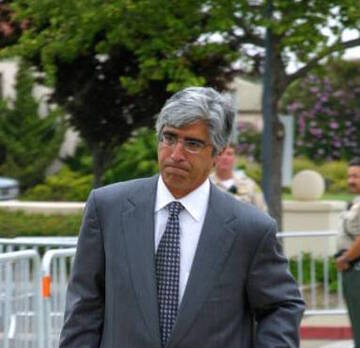 Chevron attorney Ted Boutrous. Credit: Getty Images Chevron attorney Ted Boutrous. Credit: Getty Images A climate change lawsuit brought by the state of Rhode Island against major fossil fuel producers like Chevron and Shell had a court hearing on Friday, September 11 where lawyers for each side presented diverging characterizations of the case, and the court appeared skeptical of the fossil fuel industry’s interpretation of the state’s claims. The hearing was before the First Circuit Court of Appeals on the issue of jurisdiction, or whether the case belongs in state court or federal court. Chevron and other oil company defendants are fighting to move Rhode Island’s case and similar climate liability cases to federal courts, where the companies see an easier path to dismissal. The municipalities and states suing the fossil fuel industry over climate impacts and costs want the cases in state courts. Three federal appeals courts have already decided to uphold federal district court orders sending cases brought by communities in California, Colorado, and the city of Baltimore back to state courts where the cases were originally filed. Federal District Judge William E. Smith ordered Rhode Island’s case back to state court on July 22, 2019, but the fossil fuel companies are appealing that order. Like other communities across the country that have filed these climate lawsuits, Rhode Island alleges that major fossil fuel producers engaged in campaigns of deception to undermine climate science and downplay the climate risks of fossil fuel products. As attorney Vic Sher of the law firm Sher Edling, which is representing Rhode Island and other communities suing the fossil fuel industry over climate harms, said during the hearing, Rhode Island “has asserted these well established state law claims based on a multi-decadal campaign of deception and lies, attacks on science and scientists.” “There is not a fair reading of the complaint that does not focus on the disinformation campaign and the misrepresentations that were made,” Sher said in his opening statement. Attorney Ted Boutrous, who represents Chevron and argued on behalf of all industry defendants, tried to downplay the allegations of deception when questioned repeatedly on that specific matter by the court. “Rhode Island’s allegations focus on the misrepresentations and the coverup and how that has specifically caused harm to the citizens of Rhode Island,” Judge O. Rogeriee Thompson posed to Boutrous. “That’s one piece of it your honor…it’s one piece of it,” Boutrous replied. He argued that the case is really about the production of fossil fuels and subsequent emissions causing global warming. “It’s all about the emissions,” he said at one point in his argument. But Judge Thompson and Judge Juan Torruella pressed the misrepresentation issue, saying that it seems the industry’s alleged lies are at the heart of the case. “I don’t think there’s any way to read this complaint other than it seeks to punish oil and gas production,” Boutrous said, once again deflecting to the production of oil and gas. “[Rhode Island is] not asking you to stop production. They’re asking you to stop misinformation,” Judge Torruella said. The court did not make any immediate ruling but said it would take the arguments under advisement. If the court rules against the fossil fuel defendants and decides the case belongs in state court, it would be the fourth appeals court to issue such a ruling in these climate cases this year. If the cases proceed in state court they could reach the discovery phase and trial, which the companies appear determined to avoid. Story originally published by DeSmog
Delaware, the home state of Democratic presidential candidate Joe Biden, announced on Thursday, September 10 that it is taking dozens of major oil and gas companies including BP, Chevron, and ExxonMobil to court over the rising costs of climate impacts such as sea level rise and coastal flooding. Like other U.S. states and municipalities suing the fossil fuel industry, Delaware says that the industry knew half a century ago about the likely climate impacts resulting from the use of its products, but instead of warning the public or changing their business model, the fossil fuel companies engaged in campaigns to attack climate science and downplay the risks of burning coal, oil, and gas in order to stave off policy responses. “Delawareans are already paying for the malfeasance of the world’s biggest fossil fuel companies,” Attorney General Kathy Jennings said in a press release. “Exxon, Chevron, and other mega-corporations knew exactly what kind of sacrifices the world would make to support their profits, and they deceived the public for decades. Now we are staring down a crisis at our shores, and taxpayers are once again footing the bill for damage to our roads, our beaches, our environment, and our economy. We are seeking accountability from some of the world’s most powerful businesses to pay for the mess they’ve made.” The lawsuit, filed September 10 in Delaware Superior Court, a state court, seeks monetary damages to help pay for costs the state is already incurring and that are expected to mount as climate impacts worsen. As noted in Delaware’s complaint, the state has the lowest average elevation of any state in the country and more than 22,000 residents are currently threatened by coastal flooding. Sea level rise puts at risk over $1 billion in property value as well as the state’s $3.5 billion tourism industry with the loss of beaches. Communities of color and low-income communities in the state are especially vulnerable to extreme heat events, which are expected to substantially increase in frequency in the coming decades. “The science is clear that these climate impacts are directly attributable to the products produced by fossil fuel companies,” Shawn Garvin, Secretary of the Delaware Department of Natural Resources and Environmental Control, said in the press release. These kinds of impacts could have been largely avoided or mitigated, Delaware contends, had the fossil fuel industry not actively misled the public about the risks of its product. “For too long, there has been a concerted effort by some in the fossil fuel industry to mislead the public about the science behind climate change and its devastating effects,” U.S. Senator Tom Carper (D-DE), who serves as Ranking Member of the U.S. Senate Environment and Public Works Committee, said in the press release. “While some companies have since seen the error of their ways, and are now working in good faith to find climate solutions, others have poured millions, maybe billions of dollars into hiding the truth about climate change. The people of Delaware see the effects of climate change in Delaware every day. Families and businesses in our state are already experiencing the environmental and economic consequences of the worsening climate crisis. It is unfortunate that litigation is necessary to drag those remaining bad actors into the light, but my hope is that this litigation will hold those actors accountable.” Delaware is bringing its lawsuit under legal claims of public nuisance, trespass, negligent failure to warn, and violations of the state’s Consumer Fraud Act. Defendants include 29 major oil and gas companies, one coal company, and the American Petroleum Institute (API), the largest trade association for the U.S. oil and gas industry. It is the third lawsuit filed in the last few months targeting API, which had been left out of an earlier wave of climate lawsuits. Minnesota, which announced its climate lawsuit on June 24, and Hoboken, New Jersey, which filed its suit last week, also include the Big Oil trade group as a defendant. As detailed in Delaware’s complaint, API was one of the main industry organizations behind a “sustained and widespread campaign of denial and disinformation about the existence of climate change.” This deceptive behavior, the complaint argues, is ongoing with API and some of its member companies misrepresenting the industry’s investments in clean energy and climate solutions through “greenwashing” marketing and advertising campaigns. API did not immediately respond to a request for comment from DeSmog. Phil Goldberg, Special Counsel for the Manufacturers’ Accountability Project and a former coal lobbyist whose law firm Shook, Hardy & Bacon has defended Big Tobacco, issued a statement sharply criticizing what he calls “politically-motivated legal actions over climate change.” The Manufacturers’ Accountability Project is an initiative of the National Association of Manufacturers, which represents fossil fuel producers and created the project to counter the growing wave of climate liability litigation. “Delaware’s lawsuit does nothing to advance meaningful solutions to climate change,” Goldberg said. But in a press conference held Thursday, Attorney General Jennings said her office’s lawsuit was not premised on “solving” climate change. “It is not about stopping climate change,” she said. “It is about Delaware surviving it.” 'Wave of Lawsuits' Demand Accountability for Climate Crisis Delaware is the fourth state, and the 22nd community overall in the U.S., to turn to the courts in an effort to hold fossil fuel companies accountable for harms resulting from the climate crisis. Delaware’s climate accountability lawsuit is the third such case filed in the past week, and the second in the last two days, with the city of Charleston, South Carolina, filing its complaint on September 9. “The climate crisis Big Oil caused is engulfing the nation, and it is costing communities billions of dollars,” Richard Wiles, executive director of the Center for Climate Integrity, an initiative that supports climate accountability lawsuits, said in a press statement. “With more than 20 climate lawsuits filed against them, and three in just the last eight days, it is clear that Big Oil is facing its ‘Big Tobacco moment,’ and accountability is coming for them.” The latest climate accountability lawsuits come at a time when the nation is suffering through several simultaneous crises, including the ongoing climate emergency. This has played out in dramatic and destructive fashion in recent weeks with Hurricane Laura slamming the Gulf Coast and leaving the shores and waters coated with spilled oil and petrochemicals, and widespread wildfires burning across millions of acres in the western U.S., turning skies an eerie shade of orange and resulting in at least seven deaths so far and several communities destroyed. “It is really remarkable, in the midst of the chaos of 2020, cities and states are prioritizing climate crisis accountability,” Kert Davies, director of the watchdog and research organization Climate Investigations Center, told DeSmog via email. “This wave of lawsuits is bad news for the fossil fuel mob and it is very good news that cities and states nationwide are waking up to the rising costs of the climate crisis, and they recognize exactly who to blame for the delay and denial that has cost us precious time.” Biden Pledges Support for Climate Litigation Former Vice President Joe Biden has indicated his support for polluter accountability. His environmental justice plan includes a statement pledging to “strategically support ongoing plaintiff-driven climate litigation against polluters.” Biden’s home state could see up to six feet of sea level rise by the end of the century, a looming threat that Attorney General Jennings and Secretary Garvin noted in Thursday’s press conference. “Big Oil knew its products and practices would cause ‘catastrophic’ climate consequences,” Jennings said. “We are suing to hold [Big Oil] accountable and to make them pay for the damages done to our state.” |
Archives
July 2024
Categories |
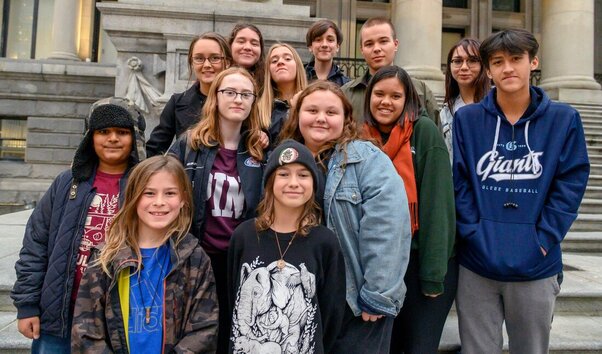

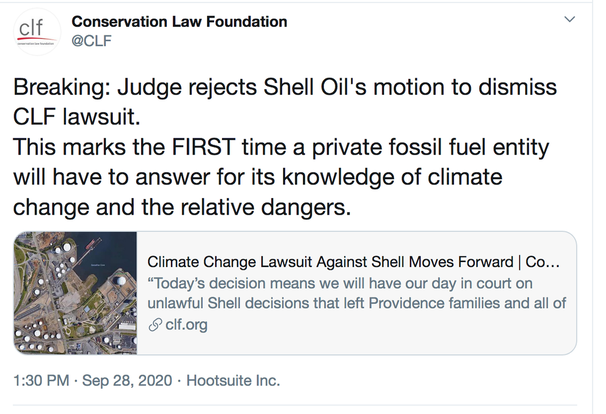
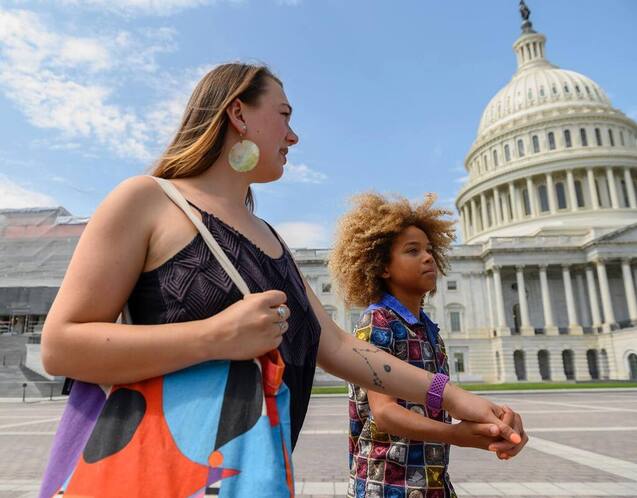
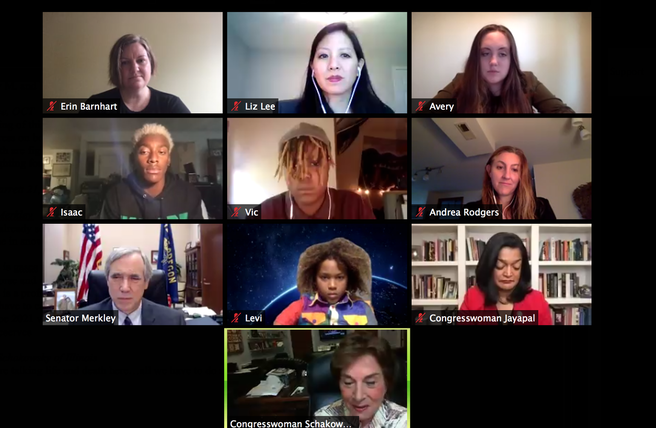
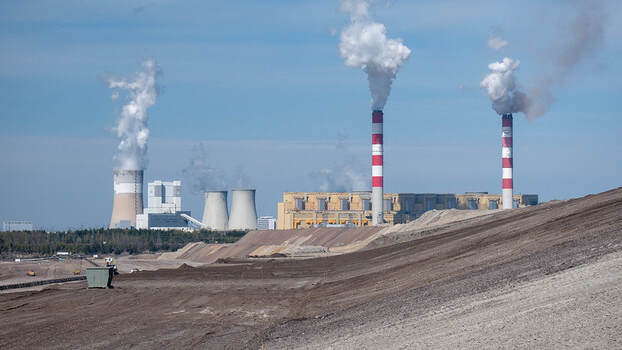
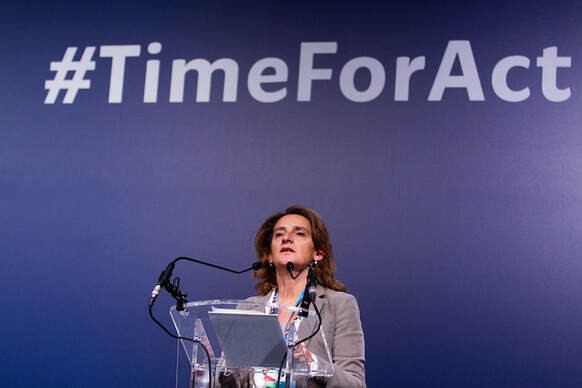
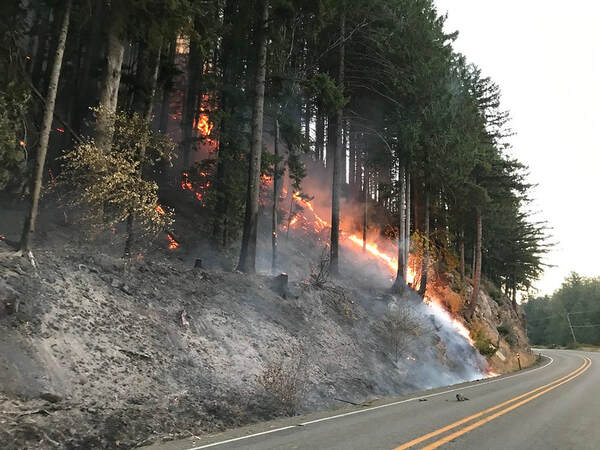
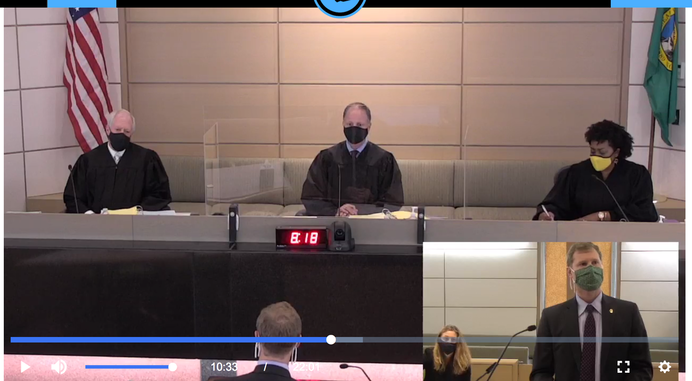

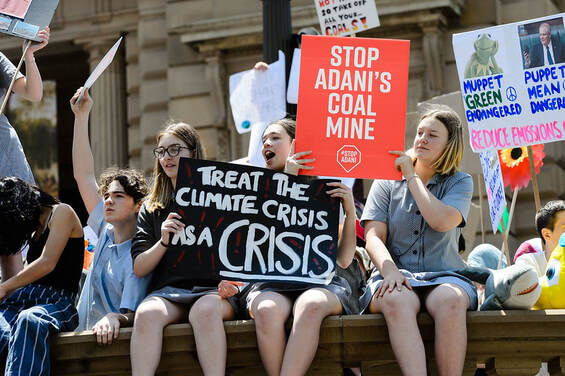
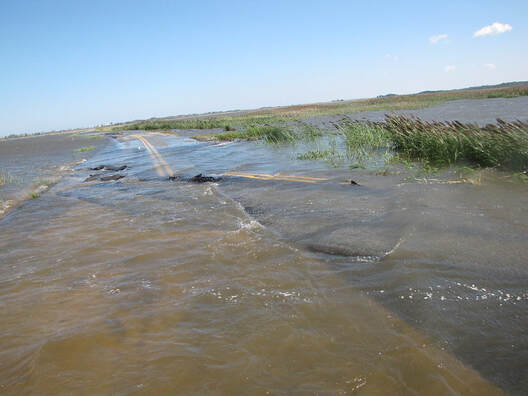
 RSS Feed
RSS Feed